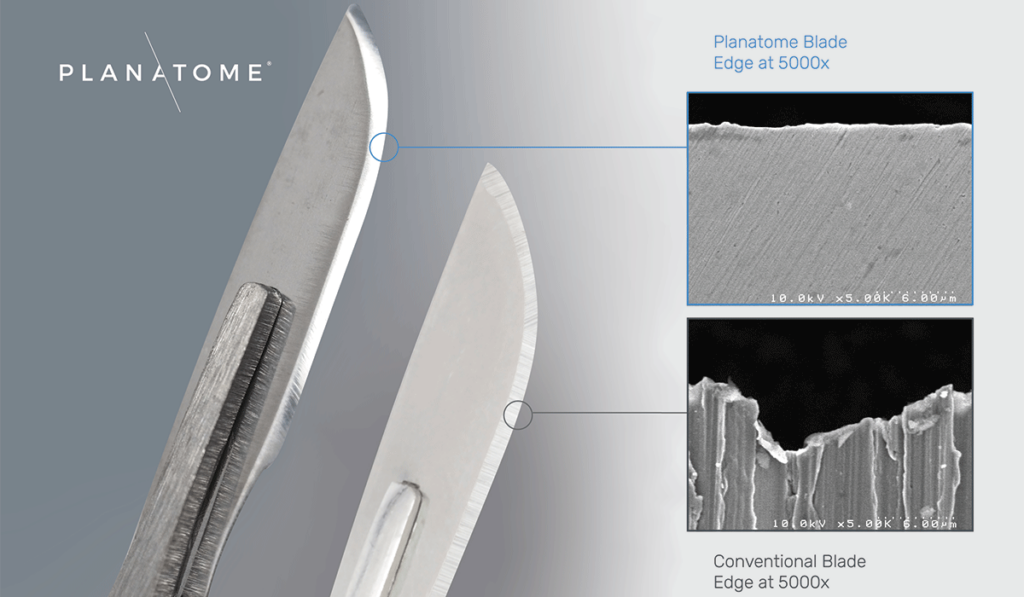 Despite the remarkable progress in medical technology, shockingly, mechanical cutting tools such as surgical blades and scissors still resemble their counterparts from the days of the Roman Empire — until now. A transformative shift is underway, led by Phoenix-based medical technology startup Planatome. The company started as a spinout from semiconductor company Entrepix by its former founder and CEO, Tim Tobin. After Tobin sold Entrepix to Amtech Systems earlier this year, Planatome explored new use cases for the highly advanced process technologies used to manufacture computer chips. Its pursuit of innovation began by addressing the most widely used surgical instrument that has experienced scant development for more than a century: the scalpel blade.
Despite the remarkable progress in medical technology, shockingly, mechanical cutting tools such as surgical blades and scissors still resemble their counterparts from the days of the Roman Empire — until now. A transformative shift is underway, led by Phoenix-based medical technology startup Planatome. The company started as a spinout from semiconductor company Entrepix by its former founder and CEO, Tim Tobin. After Tobin sold Entrepix to Amtech Systems earlier this year, Planatome explored new use cases for the highly advanced process technologies used to manufacture computer chips. Its pursuit of innovation began by addressing the most widely used surgical instrument that has experienced scant development for more than a century: the scalpel blade.
A Historic Stagnation
Remaining virtually unchanged for more than a hundred years, the surgical scalpel 22-year-old engineer Morgan Parker invented in 1915 has been and is still a primary tool used in operating rooms. Planatome recognized this stagnation and brought innovation to the surgical arena by applying a technology used in semiconductor manufacturing called Chemical Mechanical Planarization. CMP is an advanced nano-polishing technology delivering atomic-level precision to create perfectly smooth surfaces on silicon wafers. When applied to the scalpel blade, this process hones the instrument into an ultra-smooth, highly precise cutting tool with a near molecularly perfect edge.
The Impact on Healthcare
The impact of Planatome’s innovation is strikingly evident when one compares conventional scalpel blades to Planatome blades side by side. The original scalpel, with its rough and jagged edge, akin to a primitive tool in comparison, lacks the precision and finesse that modern medicine demands. In contrast, Planatome’s scalpel, with its smooth and atomically perfect blade, quite literally represents the cutting edge of surgical technology.
The implications of Planatome’s technology on healthcare are profound. Patients who undergo surgery with Planatome blades experience a vastly improved surgical outcome: Cleaner, more precise incisions deliver extraordinary benefits to patients and surgeons. There’s less tissue damage and swelling, translating into significantly faster healing times, which lowers infection risk, improves nerve regeneration, reduces post-operative pain and minimizes scarring. In essence, Planatome’s technology enables more effective procedures and raises the standard of patient care.
Beyond Patient Benefits
Surgical details matter and transforming the most commonly used surgical instruments can make the most significant difference in patient care. Planatome’s innovative scalpel gives surgeons enhanced control and a cleaner cut line with reduced bleeding. Planatome blades are comparatively highly durable, meaning fewer scalpel changeouts during surgery and more efficient procedures — ultimately resulting in improved patient care, reduced post-operative complications and a higher rate of referrals and procedure volume.
The Future of Surgery
Surgeons will have a choice between a primitive, rough-cutting scalpel that will get the job done, and a smooth, molecularly precise scalpel that leverages cutting-edge surgical technology for a cleaner, more even incision that will heal faster with less pain and provide fewer post-surgical complications.
Currently, Planatome is FDA-approved with multiple surgical blade designs available. Whether it’s cosmetic surgery; mole removal at the dermatologist’s office; or something more invasive such as a C-section, knee replacement or heart surgery, the quality of the surgical blade will complement the skill of the surgeon to provide the best patient outcomes. While the company’s current focus is on improving the surgical experience, the potential applications of Planatome’s technology are vast, both in and out of the medical field.
Photo courtesy of Planatome
















